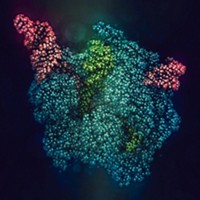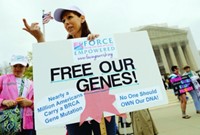Advertisement
Grab your lab coat. Let's get started
Welcome!
Welcome!
Create an account below to get 6 C&EN articles per month, receive newsletters and more - all free.
It seems this is your first time logging in online. Please enter the following information to continue.
As an ACS member you automatically get access to this site. All we need is few more details to create your reading experience.
Not you? Sign in with a different account.
Not you? Sign in with a different account.
ERROR 1
ERROR 1
ERROR 2
ERROR 2
ERROR 2
ERROR 2
ERROR 2
Password and Confirm password must match.
If you have an ACS member number, please enter it here so we can link this account to your membership. (optional)
ERROR 2
ACS values your privacy. By submitting your information, you are gaining access to C&EN and subscribing to our weekly newsletter. We use the information you provide to make your reading experience better, and we will never sell your data to third party members.
Policy
High Court To Hear Myriad Genetics Case
Patent Law: Long fight continues over human gene patentability
by Glenn Hess
December 10, 2012
| A version of this story appeared in
Volume 90, Issue 50

The Supreme Court will decide whether human genes can be patented, a long-disputed legal question that has implications for the future of personalized health care.
The justices will consider a challenge to Myriad Genetics’ patents on genetic material—BRCA1 and BRCA2—used in tests to identify an increased risk of hereditary breast and ovarian cancer.
The question for the Court is whether genes removed from the cell in a laboratory are human-made inventions eligible for patent protection or products of nature that cannot be patented.
In a 2-1 ruling on Aug. 16, a panel of the U.S. Court of Appeals for the Federal Circuit upheld the biotechnology company’s right to patent isolated genes. “The isolated DNA molecules before us are not found in nature,” wrote Judge Alan D. Lourie. “They are obtained in the laboratory and are man-made, the product of human ingenuity.”
But the patents have been challenged by a variety of medical associations and doctors, led by the Association for Molecular Pathology. They contend that Myriad’s monopoly on BRCA genetic testing restricts scientific research and patients’ access to medical care.
“Myriad and other gene patent holders have gained the right to exclude the rest of the scientific community from examining the naturally occurring genes of every person in the U.S.,” the plaintiffs, represented by the American Civil Liberties Union, say in their petition seeking review of the appeals court decision.
“These patents endanger women who deserve access to the best possible care as they make life-changing medical decisions,” says ACLU staff attorney Sandra S. Park.
Myriad’s diagnostic test has helped almost 1 million people learn about their risk of hereditary cancer, says Peter D. Meldrum, the company’s CEO. “The discovery and development of pioneering diagnostics and therapeutics require a huge investment, and our U.S. patent system is the engine that drives this innovation,” he says.
The court likely will hear the case in early spring 2013 and rule before the end of June.




Join the conversation
Contact the reporter
Submit a Letter to the Editor for publication
Engage with us on Twitter